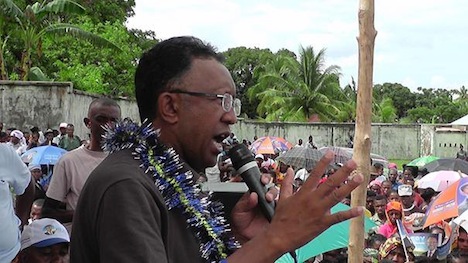For a country that marked the interim between the first and second rounds of its presidential election with an outbreak of bubonic plague, it would seem that Madagascar’s new president-elect Hery Rajaonarimampianina has his work cut out for him in a country that’s had too many false starts at both political stability and economic growth. ![]()
According to Madagascar’s election commission, Rajaonarimampianina won the country’s December 20 runoff with 53.5% of the vote to 46.5% for runner-up Jean Louis Robinson, though Robinson and his allies have alleged that the vote was riddled with fraud since December 21. Election results had been previously expected on January 7.
Rajaonarimampianina, a former finance minister, was the candidate backed by outgoing president Andry Rajoelina, a former mayor of the capital city of Antananarivo, who came to power in March 2009 in a coup that followed protests over economic conditions. Robinson, a doctor and a former health minister, was backed by Marc Ravalomanana, president from 2002 until his ouster by Rajoelina in 2009. Though Rajoelina promised prompt elections when he took power, repeated delays meant that it took four years to implement a new constitution. Those delays cost Madagascar, an impoverished country of over 22 million, much-needed developmental aid that will hopefully now be freed to pull the troubled Malagasy economy out of its doldrums. The World Bank estimates that the political crisis of the past four years caused an economic hit of around $10 billion — not a small amount considering that the country’s GDP in 2012 was just $9.975 billion.
Ambitions among all of the country’s past presidents further delayed the vote. Though Rajoelina and Ravalomanana (who remains self-exiled in South Africa) seemed to agree in early 2012 not to run for reelection under a plan brokered by the European Union, Ravalomanana’s wife Lalao declared her candidacy. Rajoelina considered that a breach of the deal, and promptly announced his presidential candidacy. Not to be outdone, Didier Ratsiraka, Madagascar’s former autocratic president from 1975 to 1993 (and again from 1997 to 2002) decided to throw his hat into the ring.
Only after Madagascar’s electoral court disqualified all three candidates in August 2013 was the path finally clear for the most recent election, though the proxies for Rajoelina and Ravalomanana quickly became the frontrunners. Among the crowded first-round field, Robinson won 21.10% of the vote to just 15.93% for Rajaonarimampianina, making the runoff an indirect showdown between Rajoelina and Ravalomanana.
If Rajaonarimampianina’s win is ultimately deemed legitimate, it could mark yet another fresh start for one of the most poorly governed countries in sub-Saharan Africa. But Madagascar’s electoral court should review allegations of fraud — if the supporters of Robinson and Ravalomanana don’t view the election as legitimate, the long-awaited vote risks serving as the prelude to another round of political instability and, potentially, violence. Despite deposits of minerals and oil, Madagascar has been slow to emerge from a planned economy into a more liberalized market that can attract the kind of foreign investment that could lift it out of poverty.
As Soamiely Andriamananjara and Amadou Sy wrote in November for the Brookings Institution, Madagascar has a knack for entering a political crisis just as its economy seems to be taking off:
Indeed, all past episodes of rapid growth in Madagascar have been short-lived and never sustained. Invariably, those growth spurts were stopped by a political crisis, each time sending the economy in a tailspin…
From a political economy perspective, the “Madagascar Cycle” is a case study of what happens when growth is not inclusive, or, to use newer jargon, when prosperity is not shared. Sure, the economy experienced growth spurts. Sure, all the macroeconomic indicators improved. But, unfortunately, some parts of society—some regions, some professions, some sectors, some business interests, and the list goes on—were left out and did not partake in the economic successes. As the economy continued to grow, so did the frustration of these excluded groups. And with frustration grew resentment. Add to the mix a dash of weak institutions and a pinch of opportunistic disgruntled politicians, and you have all the ingredients for a “Madagascar Cycle”—each time the economy seems poised to take off, political unrest erupts! The Malagasy propensity for centralized economic and political power tends to exacerbate this already explosive cocktail.
Rajaonarimampianina served as Rajoelina’s finance minister between 2009 and 2013. Rajaonarimampianina received a masters’ degree in finance and accounting in Québec in the 1980s, served as director of the National Business Institute in the early 1990s, and worked in the private sector in the 2000s as an auditor and accountant.
